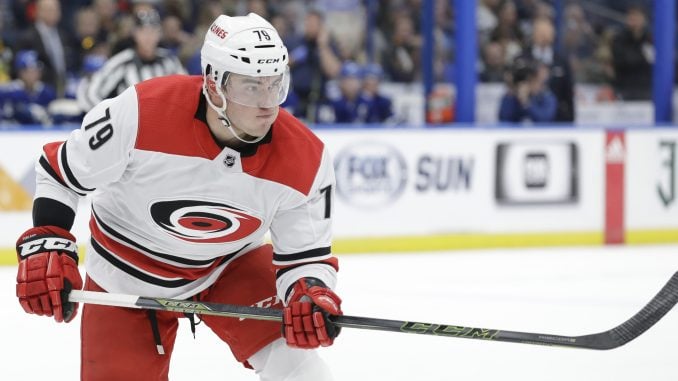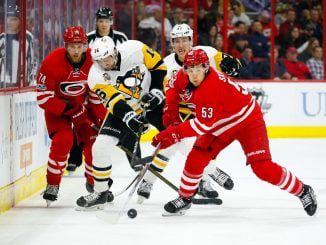
RALEIGH — Following Friday’s 4-3 home win over the Sabres, Hurricanes coach Rod Brind’Amour highlighted the play of power forward Micheal Ferland.
“He’s a super effective player, and he was, I think, obviously our best player out there tonight,” Brind’Amour said.
Ferland had his first career three-point game in the win, opening the scoring on a fortuitous bounce and assisting on two more goals playing back on the top line with Sebastian Aho and Teuvo Teravainen in Carolina’s win.
When he’s on — physical, intimidating, scoring, creating space for his linemates — Ferland fills the exact role the Hurricanes envisioned when they acquired him, along with defensemen Dougie Hamilton and prospect Adam Fox, from Calgary for former first-round picks Noah Hanifin and Elias Lindholm.
The problem for the Hurricanes is Ferland is on the final year of his contract, earning a bargain $1.75 million this season. And at 26 years old, Ferland is poised to earn the biggest payday of his career.
The two sides mutually want to stay together.
“I’d like to stay here. I’d like to get a deal done,” Ferland said after Monday’s practice.
But, as often is the case, the sticking point is money.
While social media is plastered with “5 X 5!” comments, that’s clearly not enough to get a deal done.
And why should it be? Such is the asking price for the dwindling pool of old-school power forwards in the NHL.
Evander Kane — with the opportunity to reach free agency for the first time last offseason — re-upped with San Jose to the tune of seven years, $49 million. Players older than Ferland, like James Neal (five years, $28.75 million), Max Pacioretty (four years, $28 million) and James van Riemsdyk (five years, $35 million), all got more money on deals of similar length — and none of them is capable of playing with the ferocity Kane and Ferland can.
But as much as Brind’Amour recognized Ferland’s impact against Buffalo, he — and Hurricanes management — didn’t have to look far to see what happens if you swing and miss in this scenario.
Kyle Okposo signed for $42 million over seven years to be Jack Eichel’s running mate in Buffalo. It’s now a role Jeff Skinner — not a power forward by any means — has filled perfectly.
But Okposo’s deal — and his 40-points-and-dropping production in 2½ seasons in Buffalo —could conceivably be what keeps the Sabres from paying Skinner before he tests free agency this summer.
He’s not the only example.
At age 31, Andrew Ladd got seven years at $5.5 million annually to go to the Islanders — essentially to replace Okposo. He’s managed just 67 points in his first 165 games there.
Milan Lucic, now 30, also received a seven-year deal, his worth $6 million a year from Edmonton. He’s now the poster child for how rugged play can shorten the effectiveness of a player as the years go on.
Ferland, who will turn 27 in April, has more tread on his tires than any of those three players had when they signed. The Hurricanes also have the benefit of knowing how Ferland — like Kane in San Jose — fits with their team.
Yes, there’s a price to be paid for playing the type of game Ferland does nightly — he’s missed time in each of his NHL seasons, including this year with a concussion. But there’s also a price to be paid for the team that needs the services Ferland provides.
While he didn’t get specific about which contract negotiations are moving forward and which have hit a crossroads, Hurricanes general manager Don Waddell did acknowledge that each situation has its own circumstances.
“It’s just hard to get deals done … certain players that are going to become UFAs worked their career to get to that point,” Waddell said. “So they’re treating it that way. We’d like to get deals done, but we have to have a willing partner on the other side to get a deal done and keep things moving.”
Waddell must also consider the rest of his roster and mentioned that while “the payroll might be low now,” new deals for Aho, Teravainen and others have to be considered as well.
What is Ferland worth? The easy answer is whatever the market will bear. And Ferland and his agent — Jason Davidson of Thunder Creek Professional Player Management, who declined to comment on talks with the Hurricanes — surely know the best place to determine that is negotiating with up to 31 teams instead of one.
If it comes to that, the Hurricanes will need to decide if they can afford to let Ferland walk away without compensation — some reports have the early asking price at a first round pick and a prospect — or hold onto him and treat him as their own trade deadline rental.
Ferland said it won’t be a distraction for him, and it clearly hasn’t been yet with five points in his last three games. At least for now.
“It’s not easy,” Brind’Amour said of being the subject of trade rumors during his career. “The funny thing is, generally, when you hear your name that’s usually when nothing happens.”
With wins in seven of eight games heading into Tuesday’s game in New York, Carolina is back on the playoff bubble. The question is can they stay there and climb higher without No. 79 on the top line.
Both Ferland and the team hope the trade chatter ceases thanks to an agreement on a new contract before Feb. 25. If a deal can’t be made, the Hurricanes will be left with a hard decision.



